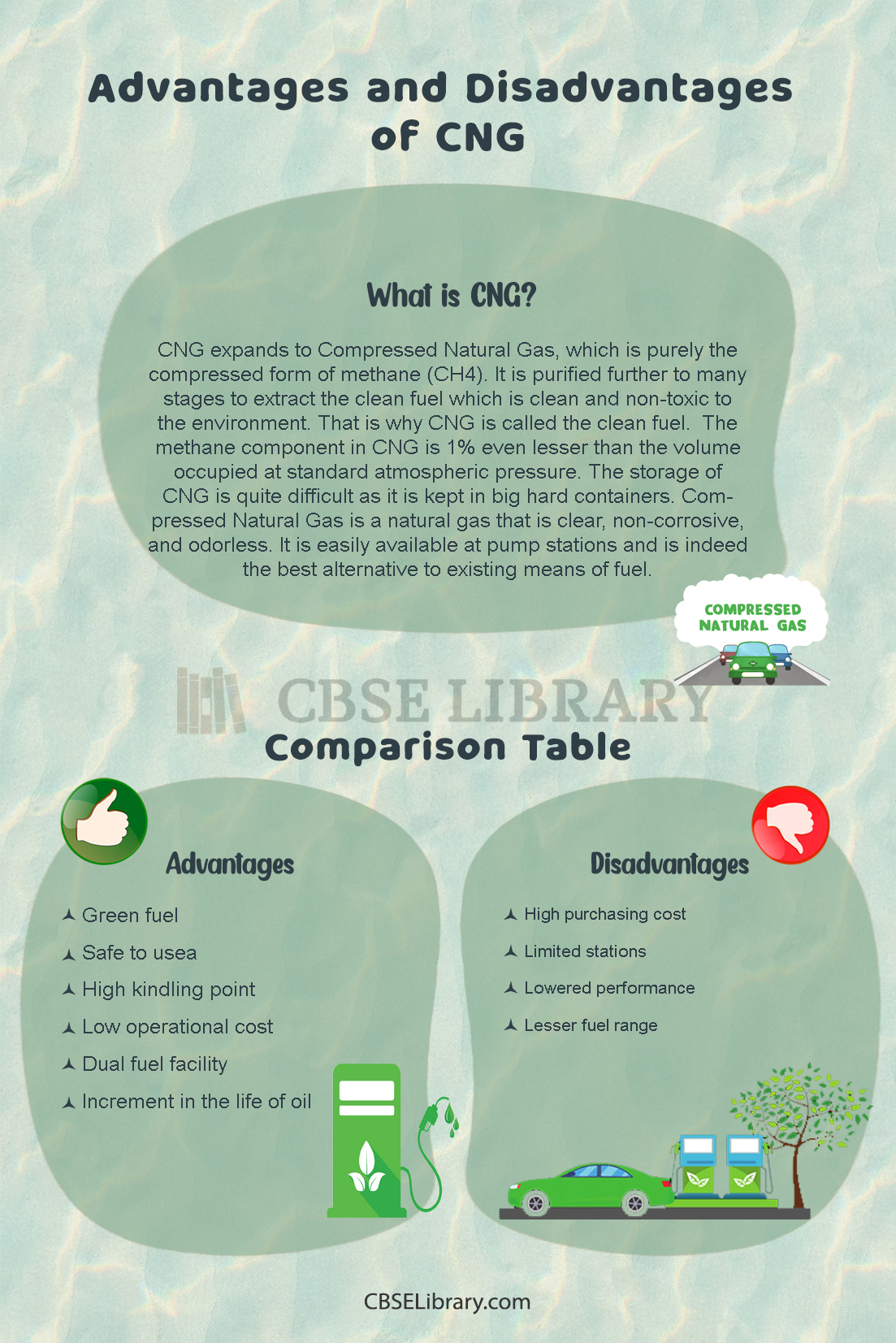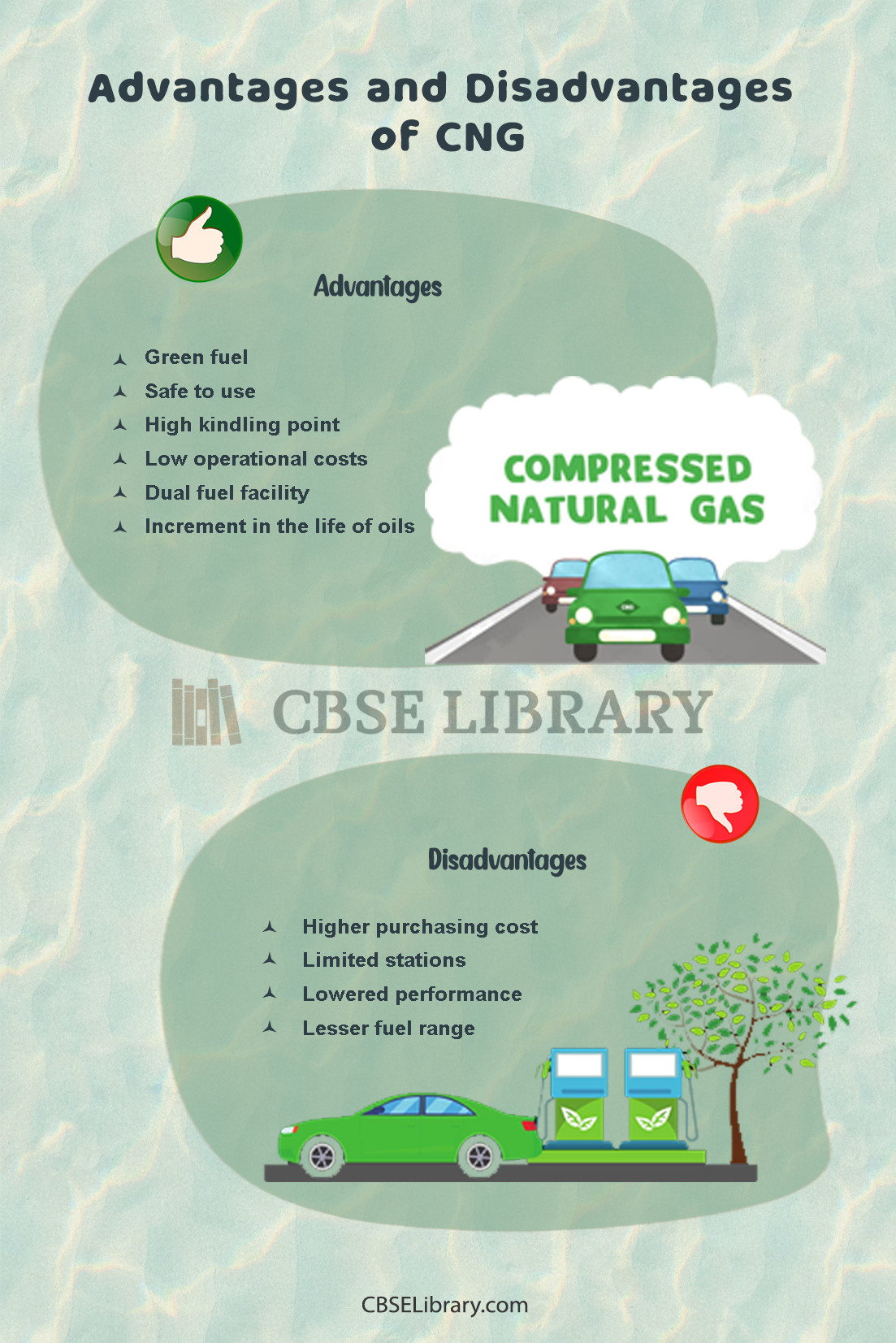CNG Advantages And Disadvantages: CNG is a very common abbreviation these days which stands for Compressed Natural Gas. CNG is a type of fuel that occurs naturally beneath the earth’s crust. It can be and is used in our daily lives for commercial and domestic purposes. CNG is a very good option to replace the traditional fuels being used, like diesel, petrol, and LPG. This is because the combustion of CNG releases lesser toxins into the environment, unlike others. Also, there are the least chances of accidents caused due to the gas leaks. This is because CNG is even lighter in weight and gets dispersed in the atmosphere quickly.
Students can also find more Advantages and Disadvantages articles on events, persons, sports, technology, and many more.
What is CNG? What are the Advantages and Disadvantages of CNG?
CNG expands to Compressed Natural Gas, which is purely the compressed form of methane (CH4). It is purified further to many stages to extract the clean fuel which is clean and non-toxic to the environment. That is why CNG is called the clean fuel. The methane component in CNG is 1% even lesser than the volume occupied at standard atmospheric pressure. The storage of CNG is quite difficult as it is kept in big hard containers. Compressed Natural Gas is a natural gas that is clear, non-corrosive, and odorless. It is easily available at pump stations and is indeed the best alternative to existing means of fuel.
- Advantages of CNG
- Disadvantages of CNG
- Comparison Table for Advantages and Disadvantages of CNG
- FAQ’s on CNG Advantages And Disadvantages
Properties of CNG
- CNG is an odorless, colorless, and tasteless compound with noncorrosive and nontoxic properties. It is extracted from the natural gas well that occurs naturally nearby some sea or big water bodies.
- The primary use in automobiles is as a substitute for gasoline. CNG is a naturally occurring gas that is formed by the decayed materials buried inside the earth for millions of years ago.
- Methane is the main component of CNG. The methane gas is very powerful as one pound of heat-trapping energy in methane is 25 times more than that of carbon.
- CNG combustion releases the gases that contain carbon nanoparticles which are the least harmful that is why CNG generally produces few greenhouse gases.
- CNG weighs much light after burning, hence it gets easily scattered into the air and does not create any big harm or accident.
- CNG is extracted from natural gas wells, methane, and oil wells.
Difference Between CNG and LPG
CNG and LPG are both fuels. We know that CNG stands for Compressed Natural Gas and LPG stands for Liquefied Petroleum Gas. The best of the differences can be understood as follows-
CNG
- The main component is methane.
- Used for commercial purposes, as an alternative- to automobiles
- CNG is comparatively cheaper than LPG.
- CNG emits the least amount of greenhouse gases.
- CNG has almost zero risk as it disperses in the environment easily.
- CNG, in case of spills, dissipates quickly.
LPG
- The main component is propane.
- Used for commercial and domestic purposes- kitchen and vehicles.
- LPG is much costlier than CNG.
- LPG is tested to release CO2, which is a greenhouse gas.
- LPG is very dangerous as it may result in blasts too.
- LPG, in case of spills, spread on the ground

Advantages of CNG
- Green fuel: CNG is often referred to as green fuel. The reason behind this is its nontoxic characteristic. It does not contain any sulfur or any greenhouse gases. On the contrary, it reduces the toxic emissions from the vehicles and increases the life of the spark plugs of the motor vehicles.
- Safe to use: Using CNG is indeed the safest means of fuel. Along with that, it can be stored easily in certified highly gauged cylinders. This certification is the assurance that the cylinder is leakproof and safe to use. If in the worst-case scenario, anyhow the gas leaks, being lighter than air, it gets dispersed in the environment quickly.
- High kindling point: The kindling point is the lowest temperature at which any substance starts to ignite. CNG has a relatively higher kindling point, unlike some alkanes. The kindling point of CNG is 540⁰C and the flammability rate is also much lower about 10-15%. Flammability rate means the temperature at which any substance starts to burn. This is the most important quality of CNG that makes it easy to use.
- Low operational costs: The ownership cost of CNG vehicles ranges is about 15-20% cheaper than other diesel and petrol vehicles. Also, it ranges between 40,000 to 60,000₹. Therefore the operational cost of CNG running vehicles is much lower than traditionally fueled vehicles.
- Dual fuel facility: It is a myth that CNG vehicles cannot use diesel or petrol. However, a CNG motor vehicle comes with the back or side facility of using diesel or petrol. And it is not a special case by the way; all the CNG-fitted cars provide this dual facility.
- Increment in the life of oils: Another benefit observed is that lubricants have a longer life because CNG does not taint or dilute the crankcase oil. Because CNG is a gaseous fuel, it quickly and evenly mixes in the air.
Disadvantages of CNG
- Higher purchasing cost: CNG although is pocketing friendly, can be expensive if the customer goes for the vehicle where the CNG is fitted in addition to the petrol/diesel vehicles. In some cases, where people wish to get a CNG car or any vehicle, they have to pay extra money to get the CNG fitted in it, which is also an extra expenditure.
- Limited stations: The most common and obvious reason which restricts the owner to choose a CNG vehicle over a petrol and diesel vehicle is the lack of availability of the CNG filling stations. The reason being CNG is not readily available in some cities and states. In fact, the cities which have the filling facility are deprived of a good number of stations. Hence, for those, who are regular travelers, it becomes difficult to get solely dependent on CNG due to the lack of its availability.
- Lowered performance: There is no doubt the fact that CNG vehicles are highly environment-friendly. But this benefit brings the drawback with it. It is that due to the added weight of the CNG, the performance of the vehicle gets disturbed. CNG-powered motors are lesser-powered compared to that diesel and petrol. In fact, the engine performance of CNG declines after regular use for over a year.
- Lesser fuel range: This advantage has two interrelated aspects. This says that the fuel i.e. CNG used in vehicles is less efficient and provides comparatively lesser mileage. Along with that, the lesser fuel range means you have to refill the fuel over and over again which is not possible because we have a limited number of CNG stations.
Comparison Table for Advantages and Disadvantages of CNG
| Advantages | Disadvantages |
| Green fuel | High purchasing cost |
| Safe to use | Limited stations |
| High kindling point | Lowered performance |
| Low operational cost | Lesser fuel range |
| Dual fuel facility | |
| Increment in the life of oil |

FAQ’s on CNG Advantages And Disadvantages
Question 1.
Can the CNG kit fitted vehicle, run on petrol or diesel after CNG is finished?
Answer:
Yes, simply by flicking a switch on the dashboard a vehicle can run on petrol or diesel after the CNG is finished.
Question 2.
How much does it cost to convert a vehicle to a CNG-friendly one?
Answer:
The cost of converting a vehicle to CNG ranges between Rs. 25,000 to Rs. 50,000.
Question 3.
What types of vehicles can be converted into CNG?
Answer:
All spark-ignited engines can be converted to CNG, for which a specially designed conversion kit is required for the conversion process.
Question 4.
Does CNG have any harmful effect on the engine?
Answer:
CNG does not dilute crankcase oil and gives it a new lease of life. The absence of any lead content in CNG helps avoid lead fouling of plugs, thereby enhancing plug life.
